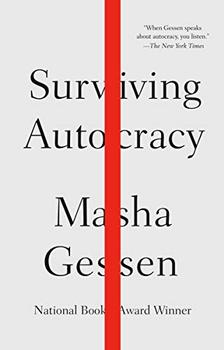Summary | Excerpt | Reviews | Beyond the Book | Readalikes | Genres & Themes | Author Bio

Critics' Opinion:
Readers' Opinion:
First Published:
Jun 2020, 272 pages
Paperback:
Jun 2021, 304 pages
 Book Reviewed by:
Book Reviewed by:
Lisa Butts
Buy This Book
1.
What Do We Call It?
It could have been any week of the Trump presidency—a week when he kept contradicting the government's experts on the COVID-19 pandemic, or a week when he was railing against Supreme Court justices, or a week when he humiliated his own cabinet members in public. Take one week in October 2019. It was a month into the impeachment inquiry in Congress and just over a thousand days into Donald Trump's presidency. The acting ambassador to Ukraine, William B. Taylor, Jr., testified about waging a losing battle against Trump and his people to pursue a foreign agenda consistent with government policy and practice. House Republicans stormed a closed impeachment-inquiry hearing in a bizarre direct action of Congress members against congressional practice. Trump's personal attorney William Consovoy argued in court that his client was immune from any prosecution—including, hypothetically, for murdering someone in the middle of Fifth Avenue—as long as he was president. And on Friday morning, The New York Times website had two headlines stacked on the left side of the home page. The top one reported that the Justice Department had launched a criminal probe into its own investigation of Russian interference in the 2016 election. The headline directly below announced that the secretary of education, Betsy DeVos, had been found in contempt of court for continuing—in direct contravention of judicial decisions—to collect student-loan payments from former students of defunct for-profit colleges. The government seemed to be at war with itself on every front.
Trumpian news has a way of being shocking without being surprising. Every one of the events of that week was, in itself, staggering: an assault on the senses and the mental faculties. Together, they were just more of the same. Trump had beaten the government, the media, and the very concept of politics into a state beyond recognition. In part by habit and in part out of a sense of necessity, we continued to report the news and consume the news—this presidency produced more headlines per unit of time than any other—but at the end of each of his thousand days of presidency we seemed hardly closer to understanding what was happening to us.
The difficulty with absorbing the news lies, in part, in the words we use, which have a way of rendering the outrageous ordinary. The secretary of education was held in contempt, and this astounding event was narrated in normalizing newspaper prose: probably the strongest description called it an "exceedingly rare judicial rebuke of a Cabinet secretary." This could not begin to describe the drama of a cabinet member remaining unrepentant for her agency's seizure of assets from people whom it had been ordered by the courts to leave in peace—sixteen thousand people. And even when we could find the words to describe the exceptional, barely imaginable nature of Trumpian stories, that approach could not scale. How could we talk about a series of nearly inconceivable events that had become routine? How do we describe the confrontation of existing government institutions with a presidential apparatus that wants to destroy them?
I found some possible answers in the work of Hungarian sociologist Bálint Magyar. In struggling to define and describe what had happened in his country, Magyar had realized that the language of both the media and the academy was not up to the task. After the Eastern Bloc collapsed in 1989, both local and Western commentators adopted the language of liberal democracy to describe what was happening in the region. They talked about elections and legitimacy, rule of law and public opinion. Their language reflected their assumptions and their limitations: they assumed that their countries would become liberal democracies—this seemed the inevitable outcome of the Cold War; and they had no other language at their disposal anyway. But if we use the wrong language, we cannot describe what we are seeing. If we use the language developed for describing fish, we cannot very well describe an elephant: words like "gills," "scales," and "fins" will not get us very far.
Excerpted from Surviving Autocracy by Masha Gessen. Copyright © 2020 by Masha Gessen. Excerpted by permission of Riverhead Books. All rights reserved. No part of this excerpt may be reproduced or reprinted without permission in writing from the publisher.





The House on Biscayne Bay
by Chanel Cleeton
As death stalks a gothic mansion in Miami, the lives of two women intertwine as the past and present collide.

The Flower Sisters
by Michelle Collins Anderson
From the new Fannie Flagg of the Ozarks, a richly-woven story of family, forgiveness, and reinvention.

The Funeral Cryer by Wenyan Lu
Debut novelist Wenyan Lu brings us this witty yet profound story about one woman's midlife reawakening in contemporary rural China.
Your guide toexceptional books
BookBrowse seeks out and recommends the best in contemporary fiction and nonfiction—books that not only engage and entertain but also deepen our understanding of ourselves and the world around us.